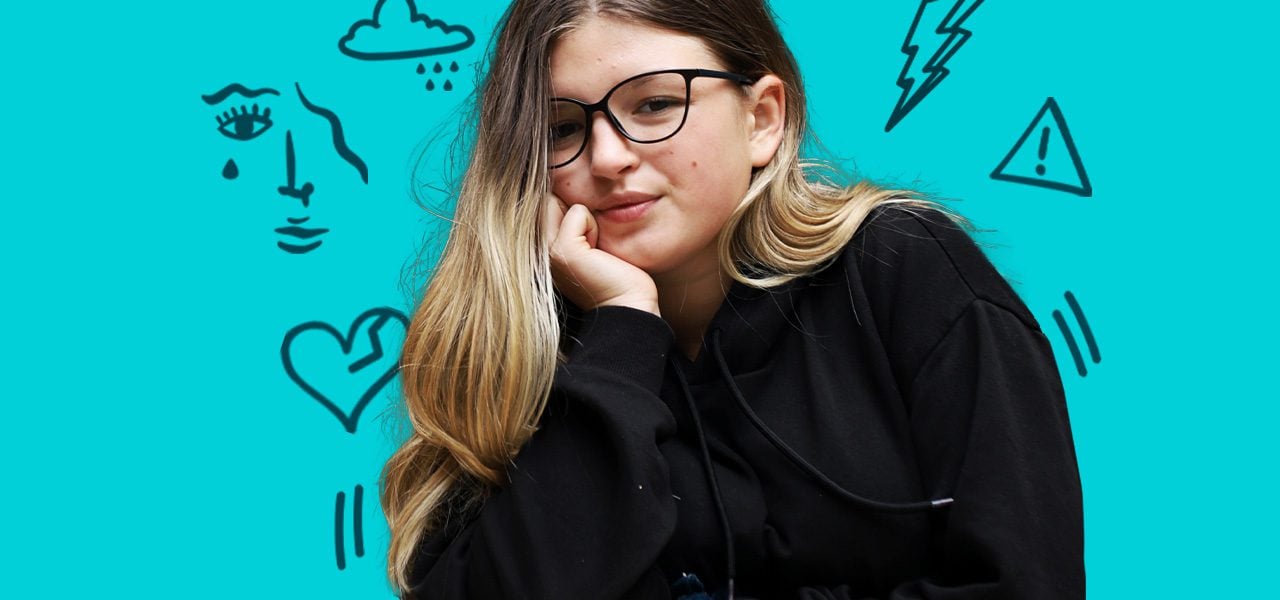EHN Online’s Healthy Minds Comprehensive Teen IOP Program is an effective treatment option for teens experiencing depression and anxiety. But suggesting therapy for teenage children is another story. Here’s some helpful advice.
“I think people think of therapy as this big scary monster,” says Dayna Browne, MSW, Clinical Lead for EHN Canada’s Healthy Minds Comprehensive Teen Program. “But the way I look at it,” she continues, “it’s learning about relational skills – both internally and externally. How you relate to yourself. How you’ve been taught to relate to yourself. And how you show up for yourself in the world.”
And that is the intention behind the online teen mental health program.
According to the Mental Health Commission of Canada, one in five, or 1.2 million, children and youth in Canada are affected by mental illness. However, less than 20% of those affected will get the treatment they need. What happens when parents and caregivers identify signs of struggle and encourage teens to seek treatment? Many young people, especially those with a rebellious streak, may choose to ignore the advice, no matter how founded it may be. And others may begin treatment but quickly lose interest.
We talked to Browne about how parents and caregivers, who may be thinking, “Does my teen need therapy?,” can encourage teens to begin – and stay in – treatment.
Understanding when a young person needs therapy
Moody teen…or something more serious? Browne says, “I think sometimes when symptoms present, the parents aren’t really sure if it is a mental health challenge that needs treatment or if it’s just related to the general growth and changes that adolescents typically go through. Sometimes it’s hard to distinguish.”
What mental health symptoms should parents and caregivers look for? Browne continues, “It’s important to notice over a two-week period where there’s a pronounced difference, whether it’s in their behaviour or they’re thinking about things. Teens tend to have more significant changes in things like being more impulsive or acting out or withdrawing.”
Here are 5 signs of teen mental health struggles you can watch out for:
1. They’re falling behind in school
2. They’ve experienced unexplained weight loss/weight gain
3. They’re withdrawing socially and losing interest in their hobbies
4. They’re using drugs or alcohol frequently
5. Their sleeping patterns have changed dramatically
Read more about signs and symptoms here.
First broaching the topic with teens
When it comes to enrolling in mental health treatment for teens, Browne says it is most often a parent or caregiver who have to make the initial suggestions: “It generally is the parent who wants their teen to go to therapy. They recognize that their behavior is a problem, while the teen doesn’t necessarily see it as a barrier to their wellbeing.”
When making the suggestion, she says, “Take a non-judgmental approach to actually broaching the topic. I think sometimes it’s just difficult to even have it in a sort of safe way that the teen feels open to share their concerns.”
She also says that getting young people to take an active interest in their own wellbeing is key: “It’s about getting teens to identify personally what their best hopes are, what they hope to gain from therapy.”
When it comes to asking teens about their mental health, use open-ended questions that are respectful of their space, timing and mood. Focus the conversation on areas of stress, capacity, functioning and general concern in a non-judgmental way. Here are some suggestions:
• I notice you don’t seem quite your usual self lately. Is there anything bothering you’d like to chat about?
• How are your stress levels lately? Are you coping okay?
• Is there anything specifically I can do to help support you?
• When is the best time to check-in with you?
• How is your sleep this week?
• How are your energy levels with managing everything?
“Consistency is key,” Browne says, “and a warm approach, showing care and concern helps to foster more connection in hopes teens will open up further to receive support. Keeping the conversation casual and engaging without being assumptive is always a good move!”
Getting teens to stick with treatment
“Retention is an issue,” Browne says. In order to get resistant teenagers to commit to the 8-week treatment program, parents and caregivers need to show continued support, but she understands the challenges parents face.
“Some parents just don’t have the capacity. They have other kids and they’re really struggling to support their child through the process which can be very challenging for that young person. However, we see that teens who have the support and the parents who are more involved and engaged – answering questions and making sure that they decrease any vulnerabilities in their child’s life, eliminate distractions, monitor things, schedule ahead of time, so that the child’s not overwhelmed – those parents and youth tend to have better results. They tend to have better progress in treatment than youth who don’t.”
Be willing to open up about your own mental health experiences
How do you encourage a teenager to talk about their mental health? Creating a home that is welcoming can help teens feel more comfortable opening up themselves. This will likely transfer into their program and group discussions, making it easier to discuss and learn. Browne explains, “We’ve had a lot of suicidal ideation with teens in our program. So, when that topic comes up in the home, are parents prepared or willing to go there? The parent may have a history of trauma and suicide themselves. So, we’re looking at mirrors here. Where is the parent at? And are they willing to be vulnerable enough to go there with their child? And if they are, that’s great!”
If a parent doesn’t feel comfortable broaching such an intense subject, continuing with an open dialogue around the house may help both the parent and the teen eventually reach a point where suicidal ideation can be discussed. It can take time, but perseverance and support from professionals can help get there.
Know that matters might get worse before they get better
If parents, caregivers, and teens themselves think that a few therapy sessions will lead to instant results, they will be disappointed. In fact, when a patient begins therapy, the unearthing of emotions, triggers, and past traumas may actually make them feel temporarily worse. The desire to stop treatment at this point, though, would interrupt the therapy process, Brown says.
“Let’s say we do eight sessions. In those first few, some things can really start coming out right from under the rug, so to speak. And it’s really important in that time that [parents and caregivers] be a little bit more attuned and supportive. That’s a time where the teen is unearthing a lot of things that they may be holding onto for some time. And so, new negative emotions may occur at the onset of treatment, but positive change will come with time and perseverance. And that’s why we are very evidence-informed. We do outcome measures every few weeks, and we have bi-weekly reporting so that we can track in a factual way: is the teen really making progress?
“And the family, though, experiences the same thing with them, as they’re going through this journey. But other times, there’s not a congruency. The parents do see changes in behaviour but the teens don’t – because they’re feeling it. They’re feeling the emotional intensity of going through therapy. So, sometimes the teen wants to drop out.”
Clinicians and clients both willing to “show up”
When teens are a part of the Healthy Minds Comprehensive Teen Program, they are working with EHN Canada’s passionate clinicians and therapists, like Browne herself. And it’s also their dedication and support of teens that can encourage them to stick with treatment and get the most from it.
“I bring myself to practice as much as I can,” Brown says. “Teens like to test how authentic you are and how committed you are.”
And it’s also about giving them space and autonomy: “For a teen, it is so important that they lead this journey to what we share and what we process. Because at that age, giving them that autonomy and that decision making is really part of the work. It may feel like they haven’t had that level of power agency in their life because they’re being pathologized all the time by institutions.”
Reflecting on her own relationship with young clients, she says, “How do I get the youth to really commit to thinking that they deserve better than what they are currently experiencing? It’s really important to understand what matters to them and why they even came to therapy in the first place versus the reasons why parents pushed them into therapy. It’s really about the meaning that they take from the therapy versus what’s been presented to them.”
What is the Healthy Minds Comprehensive Teen Program?
The Healthy Minds Comprehensive Teen Program is an online program for teens struggling with depression and anxiety. Using a combination of dynamic coping strategies and evidence-based care, and our app, this program provides a supportive, structured treatment experience to help youth and their caregivers make meaningful changes in their lives and wellbeing.
Designed for teens aged 14-17 experiencing symptoms of anxiety and depression, the program provides them with the counselling, education, and support they need to thrive. Also included are educational and supportive sessions for caregivers to help foster a healthy and open environment for teens to grow.
The program includes:
• Virtual treatment from home means no disruption to school and life
• Evidence-based treatment administered by youth mental health specialists
• 12 hours of educational programming for caregivers
• Parent and caregiver education so they can offer better support
For Teens
• 44 hours of evidence-based therapy across 24 weeks.
• From Weeks 1-9, teens will participate in 2 hours of group therapy and 50 minutes of individual therapy per week in cohorts of 10.
• From Weeks 10-24, teens will use the Wagon app combined with bi-weekly group therapy meetings for maintenance of new education, habits, and wellness.
For Caregivers
• Four three-hour sessions, based on emotion-focused therapy (EFT) to help caregivers foster a healthy, informed and supportive environment for their teens to grow.
• Caregivers will learn: skills for parental coaching and cooperation; family safety-planning; psychoeducation on mental health; increasing effective responses; strengthening abilities to co-regulate; identifying new boundary setting strategies; building awareness; and setting healthy limits
Why choose the Healthy Minds Comprehensive Teen Program?
There are many mental health support options available, including iCBT apps, claiming to treat depression and anxiety, but the Healthy Minds Comprehensive Teen Program stands apart with:
• Programming developed and led by clinicians specializing in Child and Youth mental health
• Regular outcome reports for teens, caregivers and referring professionals
-Educational programming for caregivers
• Combination of talk therapy and interactive exercises
• Media, music and game-based mindfulness
• Discharge recommendations
What skills will teens develop?
The program curriculum is designed to help teens develop a thorough understanding of their mental health as well as provide a variety of skills and practices to help improve their quality of life, including:
• Integrated mindfulness
• Practical grounding and self-soothing techniques
• Sensory coping skills
• Distress tolerance and emotional regulation
• Managing discomfort and diffusing difficult emotions
• Resiliency tools for coping
• SMART goal setting
Want to find out more mental health treatment for your teenager?
Talk to our referral team at 1-866-935-1521.
Contact Us
Bellwood
Toronto, ON
1-800-387-6198
Edgewood
Vancouver Island, BC
1-800-683-0111
Ledgehill
Lawrencetown, NS
1-800-676-3393
Sandstone
Calgary, AB
1-587-350-6818
Gateway
Peterborough, Ontario
1-705-535-0636
Nouveau Depart
Montreal, Quebec
1-888-488-2611
Outpatient Services (Multiple locations): 1-888-767-3711




